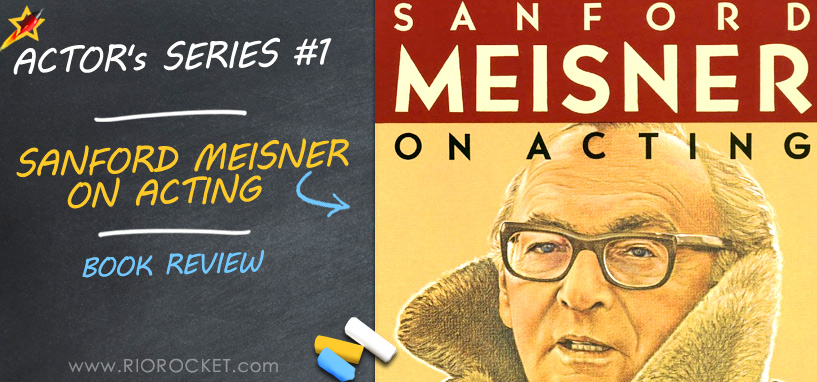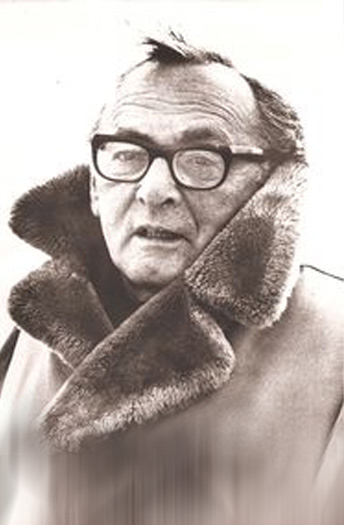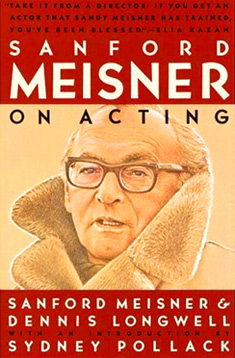
All Graphic Design by Rio Rocket
Who Is Sanford Meisner?
Sanford Meisner was head of the acting department of The Neighborhood Playhouse for forty years and founding member of The Group Theater. Considered one of the greatest acting teachers of our time he was teacher to thousands of actors. Some of the more notable names were, Elizabeth Ashley, Barbara Baxley, Jame Broderick, James Caan, Robert Duvall, Diane Keaton, Steve McQueen, Gregory Peck, Tony Randall, Jon Voight and Joanne Woodward.
“Sanford Meisner’s work was, and is, to impart to students an organized approach to the creation of real and truthful behavior within the imaginary circumstances of the theater.“
This book is the bible for anyone studying the Meisner Method of acting but it brings energy, excitement and imagination that even non-actors will enjoy.
What To Expect
Written in collaboration with Dennis Longwell, the book follows an acting class of eight men and eight women for fifteen months. They begin with rudimentary exercises, laying the groundwork of their acting skill as they advance toward the more advanced exercises. The class eventually progresses to rehearsals of polished scenes from contemporary American plays.
What you’ll want to focus on as a beginner who is either studying the Meisner Technique or considering the study thereof, are the principles embedded within the repetition exercise and Meisner’s insightful commentary throughout the learning process.
Key Points of the Book
Sanford Meisner’s core principles of acting:
- Acting is the ability to live truthfully under imaginary circumstances.
- The ‘Foundation of Acting’ is the reality of doing.
- The ‘Quality of Acting’ depends on how fully you’re reacting to your partner. That’s what makes you believable as an actor.
Simply put…
Acting is living truthfully under imaginary circumstances. Your completeness in it and how fully you do what you do determines how good of an actor you are.
Principles (Basic Instincts)
1. Don’t do anything until something happens to make you do it (otherwise you will create an untruthful thing).
2. What you do doesn’t depend on you. It depends on the other person (you’re working off them).
3. The quality of your acting depends on how fully you do what you do.
Cementing 1 and 2 leads to 3.
The Meisner Technique in Motion
Meisner is widely known for his Word Repetition Game which is a ping-pong game of words and the basis in what eventually becomes emotional dialogue. The goal is to repeat what you observe in your partner from your point-of-view. You can see how this quickly develops into a emotional dialogue in this video.
There is no intellectual thought involved, purely impulse and instinct that govern the repetition. When you’re really listening and looking at your partner you’re too focused to worry about “acting” or playing the character. You have now become the character
Note: There is no script provided to the participants. Every repetition is based on the actor’s observation and although the circumstances are imaginary their emotions are real and truthful.
Lessons for The Actor
1) Scripts are your WORST ENEMY: Scripts are constricting so learn words and their context. Be OPEN, susceptible, available and vulnerable to your acting partner.
2) EVERY MOMENT has a meaning: A moment of silence isn’t nothing. It means something. Acting isn’t (just) talking, it’s living off the other fellow.
3) Act in a state of Public Solitude (Stanislavsky) – the act of not being audience conscious. You have one element to give up to get to where your real acting personality is,
and that is yourself (self-awareness).
4) Imagination: If you come to text that’s cold to you, create circumstances that can bring you to the emotion necessary for the scene. This is an area of acting which makes its demands entirely on your imagination. If you are imaginative, it’s instinctive.
Is Meisner's Technique Still Effective for Modern Acting?
In a word…YES
My experience: I had the pleasure to study The Meisner Technique with Alan Gordon in Manhattan. I immediately noticed its similarities to my previous study of Improv at The Peoples Improv Theater. If there is one thing I learned which ‘stuck’ is how to connect with my acting partner on a deeper emotional plane. It happens simply through listening.
I also learned that you must enter every scene with fullness. You must begin with a full emotional life. This only needs to be done at the beginning as the scene will dictate where you go emotionally from there. You also don’t need to come completely pouring out all the time, ‘just get the top off’.
TIP: A question I often ask a director is what happened (to me) right before I got here. That helps tremendously in determining my emotional state. Knowing what just happened prior can determine if I should be caught off-guard from the events in the current scene or just come in outraged/ecstatic/stoic/etc.
Meisner on emotion,”If you can’t find it or don’t have it – don’t bother – just say the lines as truthfully as you are capable of doing. Don’t fake the emotion though – it exposes the fact that you ain’t got it.”
Once again acting is living truthfully under imaginary circumstances. Your completeness in it and how fully you do what you do determines how good of an actor you are.
Stay subscribed or Join Today for more updates with book reviews on the topic of acting and personal growth just like this.
Where to purchase 'Sanford Meisner on Acting'
- Paperback: 272 pages
- Publisher: Vintage; 1 edition (July 12, 1987)
- Language: English
- ISBN-10: 0394750594
- ISBN-13: 978-0394750590
- Product Dimensions: 5.2 x 0.6 x 8 inches





